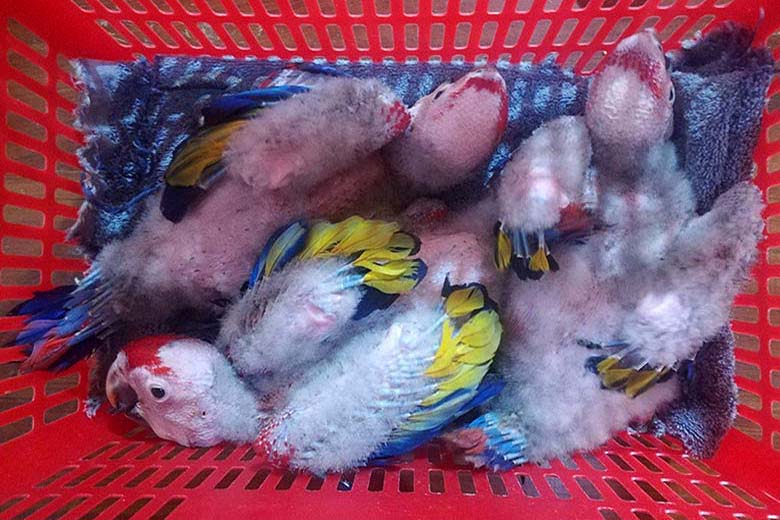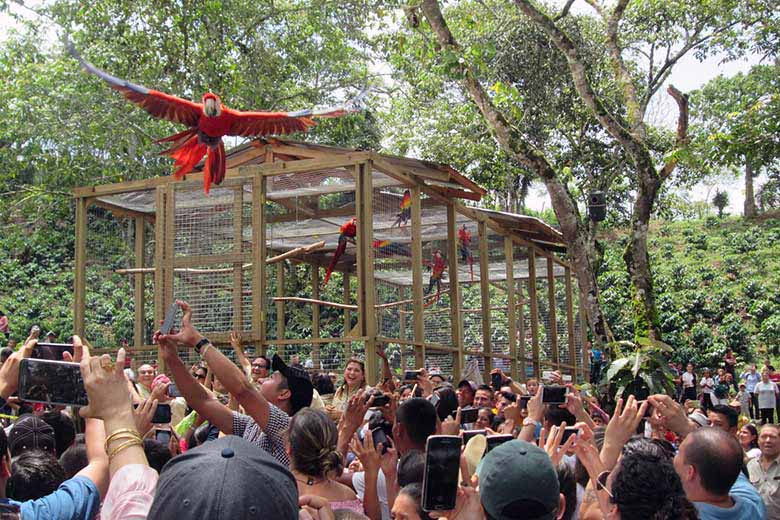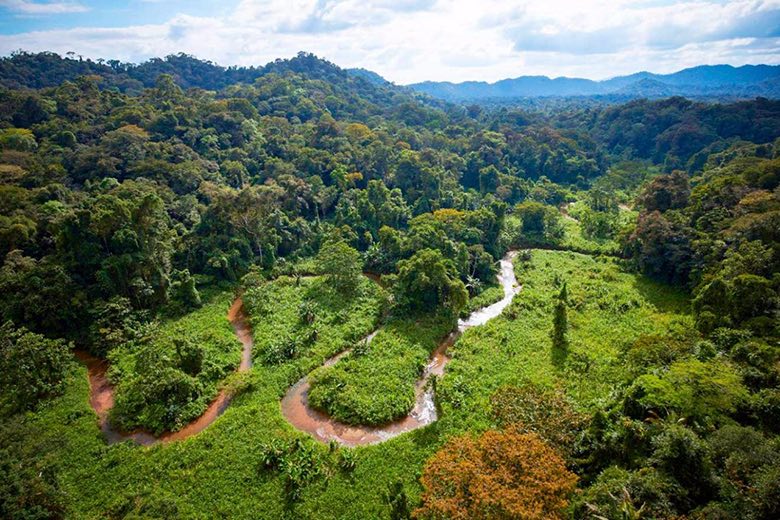Our mission
Our mission covers two interconnected areas of effort that will result in a higher level of protection for threatened populations of tropical parrots and other avian species in Central America.
The 4 R's
The “hands-on” component of our work involves the direct interaction with the birds and is best described as “The 4 R’s”:
1. Rescue
PRO-ALAS will establish accords and work closely with Honduran wildlife agencies and legal authorities to take in confiscated birds and move them to an appropriate care facility (normally Macaw Mountain) for evaluation and treatment as required.
In addition, donated captive birds will also be taken in and put on a track for liberation should that be ultimately feasible. Donation events will be set up indifferent regions of the country to encourage the return of parrots and macaws from captivity to better living conditions and perhaps to freedom. Large numbers of these birds are currently held as pets in many communes across Honduras.
2. Rehabilitation
PRO-ALAS will continue the work of rehabilitating the confiscated and donated birds initiated by Macaw Mountain. In fact, the two will work together to expand this element as Macaw Mountain has a well-trained team and a complete infrastructure. PRO-ALAS will focus on assembling releasable groups and on the logistics necessary to return them to the wild.
The incoming quarantine, veterinary care, selection for release or breeding groups, and flight training will be continued at Macaw Mountain and expanded as needed. PRO-ALAS will assume responsibility for governmental coordination and permitting involved in the rescue, selection, and coordination of release sites, and will develop funding to support the effort.
3. Reproduction
In order to restore a depleted avian population or to successfully return a species to an area it once inhabited, it is necessary to have a continuing and reliable source of those birds. Currently PRO-ALAS utilizes a nest box program to maximize the number of parent-raised chicks in free-flying groups since natural nesting cavities are often in short supply. This effort in 2018 produced 20 healthy Scarlet Macaws in the three groups managed by Macaw Mountain.
PRO-ALAS will develop a breeding center to allow incubation, hatching, and hand-feeding of additional chicks to increase and accelerate the release possibilities. Initial training in these techniques has already begun to acquire the necessary expertise ahead of any breeding facility construction.
4. Reintroduction
PRO-ALAS will arrange and oversee all aspects of the release and reintroduction process from conceptual start and acquiring government permits, local site selection and coordination including getting community support and participation, to the eventual post-liberation monitoring.
This is not a simple process and requires a well-trained, multi-functional team that can handle everything from bird care and logistics to public relations and critical environmental educational aspects, and this in multiple locations.
Continuing educational effort
The second major impulse of the PRO-ALAS mission is a continuing educational effort aimed at generating the cooperation necessary to protect the free-flying populations and preserve their critical and equally threatened habitat.
Our program uses the actual birds themselves to “pitch the sale” and the experience in Copán has been both very positive and extremely encouraging. Initially the locals were quite pessimistic about the effort saying the macaws would be killed, stolen, or trafficked but none of that happened and the birds are now a major source of local pride. It is important to note that the Copán releases were into a populated valley, not into a protected forest reserve.
A nine-lesson curriculum with information on the Scarlet Macaw’s life history and its importance in the ancient Mayan culture was presented in the local schools, including those in the surrounding mountain villages. Classroom visits with macaws from the bird park provided the personal interaction to “seal the deal”. Follow-up trips to Macaw Mountain by school groups reinforced the classroom experience and the local cooperation throughout the valley has been exceptional.
The “outreach releases” that PRO-ALAS must accomplish around the country will not have the Copán advantage of a local feel with easily formed alliances. To disseminate the crucial information about the birds in favor of their conservation we must cooperate closely with the Honduran government to have it included in the national school curriculum. This approach will be cost effective, will ensure the basic information will be widely distributed, and will help pre-sell the macaw release concept in areas that will eventually receive the birds.
Promotional signage and materials, macaw-related celebrations and events, and local and national TV and radio spots will all be important elements in winning popular support for the return of the macaws. Several government entities such as ICF, Marca País, and the Department of Tourism have information and marketing arms that can work with us to popularize the programs.
And beyond...
Beyond the educational efforts to make the actual liberations possible and to keep the birds safe on the long term, PRO-ALAS will make an important contribution to conservation awareness nationwide. The impact of the Scarlet Macaws in Copán has been undeniable and the rapid popularization of their image throughout the country has been stunning. The potential of this iconic species as a symbol for environmental protection is enormous, especially in a country where it is also the national bird. To protect the old growth forest where the macaws can thrive is to also protect the huge diversity of flora and fauna that shares that forest.
PRO-ALAS will make the first argument for protection with the spectacular Scarlet Macaws but will rehabilitate and release a range of less prominent avian species adding to the message. The liberated macaws will be a powerful livid tool in the Honduran conservation effort.
Beyond the educational efforts to make the actual liberations possible and to keep the birds safe on the long term, PRO-ALAS will make an important contribution to conservation awareness nationwide. The impact of the Scarlet Macaws in Copán has been undeniable and the rapid popularization of their image throughout the country has been stunning. The potential of this iconic species as a symbol for environmental protection is enormous, especially in a country where it is also the national bird. To protect the old growth forest where the macaws can thrive is to also protect the huge diversity of flora and fauna that shares that forest.
PRO-ALAS will make the first argument for protection with the spectacular Scarlet Macaws but will rehabilitate and release a range of less prominent avian species adding to the message. The liberated macaws will be a powerful livid tool in the Honduran conservation effort.








